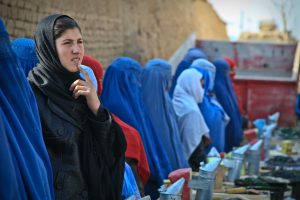“Women must be meaningfully included for societies to prosper.” How many times have we heard — or said — these words? And how many times have we actually meant them? Do we mean them now in Afghanistan?
For more than two decades, the world has neglected to fully follow through on our promise to do better, especially in the context of women, peace, and security. Current events in Afghanistan further reflect our failure. Afghan women are understandably worried.
The Taliban and the Afghan government began historic peace talks on September 12, aimed at shaping a power-sharing agreement that would end decades of war. Currently, the talks are stalled over disagreements that impact the rights of women and girls. While four women serve on the Afghan government’s 21-member team, there are none on the Taliban’s side. Additionally, the Taliban haven’t met the conditions of their 2020 agreement with the United States, with rates of violence surging since talks began.
The broader context is also worrisome. As in every other country, COVID-19 has disproportionately affected Afghan women and girls. From limiting access to education and economic participation to increased gender-based violence, child marriage, and exploitation, these consequences are dire.
Afghan women — and all Afghans — want peace. But that peace cannot come at the unacceptable cost of the hard-won rights, opportunities, and contributions of Afghan women and girls.
“Democracy must not be up for negotiation,” according to a statement from the Afghan Women’s Network, which calls for equal access to justice and protection under the law, ensuring women’s fundamental rights, and the right to a life of dignity.
While the Afghan peace negotiations provide hope, the United States and the international community must ensure women’s meaningful participation in current negotiations and acknowledge that peace is not possible or sustainable without them. Any political settlement that doesn’t guarantee women’s rights and opportunities has failed before it has begun.
What happens in Afghanistan matters to us here at home. It would be a grave mistake for the United States to disengage without a clear roadmap for peace that protects hard-won gains. In addition to promoting stability and security today, the precedent that is set will serve as a blueprint for tomorrow.
That’s not to say the U.S. military must maintain a presence in Afghanistan indefinitely. The Afghan people should and will control their future. But at this crucial time, continued support and security are needed.
We know that when women and girls hold equal and active roles in societies, communities and countries thrive.
From Liberia to Colombia, Afghanistan to Northern Ireland, across the world women have mobilized to press for stability, good governance, and reconciliation. However, despite international commitments such as United Nations Security Council Resolution 1325 and the Beijing Declaration and Platform for Action – as well as the bipartisan Women, Peace, and Security Act of 2017 in the United States – there hasn’t been enough follow through when it comes to recognizing the importance of women’s equal and full participation in the promotion of peace and security. The truth is that women remain underrepresented or absent from peacebuilding efforts worldwide.
A quarter-century after Beijing, we should be doing better – especially knowing that the exclusion of women fortifies inequity and instability.
From 1992 to 2019 women made up 6 percent of mediators and signatories across major peace processes, according to the Council on Foreign Relations. And, over the last 30 years, most agreements have failed to reference gender, let alone critical topics like violence against women and girls.
Women in 2020 comprised just “20% of negotiators in Libya’s political discussions, and 0% of negotiators in Libya’s military talks and Yemen’s recent process,” according to CFR. In Colombia, implementation of gender-specific stipulations in the country’s 2016 peace deal was delayed in comparison with broader commitments in the accords, according to the University of Notre Dame’s Kroc Institute for International Peace Studies.
The peace talks in Afghanistan present a critical opportunity to correct course on women, peace, and security.
What we do – or do not do – in Afghanistan demonstrates to the world the value we place on free and fair societies. That the agency and active participation of all individuals – regardless of gender – matters for the greater good. And that good governance, accountability, and meaningful inclusion are imperative for peace and prosperity everywhere.
Natalie Gonnella-Platts serves as the Director of the Women’s Initiative at the George W. Bush Institute.
Farhat Popal serves as Senior Program Manager of the Women’s Initiative at the George W. Bush Institute.

































